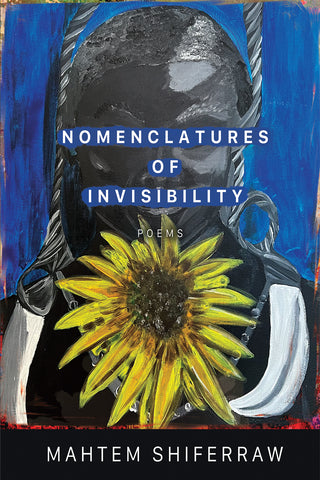
About This Title
In Nomenclatures of Invisibility, Shiferraw calls us to carve out space for the multitudes of selves we carry when we migrate across boundaries of body, language, and land. With momentum, giving name to everything in her path from the longing that comes with migration to her beloved eucalyptus tree, she blurs physical and temporal borders, paying homage to ancestors past, present, and future. Shiferraw writes unapologetically against erasure, against invisibility, instead creating a space that holds grief lovingly, that can tend to the wounds held and held in the endlessly-traveling body. Brilliant with abundance and texture, Shiferraw’s poems dismantle the empire's sterile use of language, both historical and present.
In Nomenclatures of Invisibility, Mahtem Shiferraw builds a home within her poems, attentively naming those who exist within them out of invisibility and into the radiant light: “We walk / in unison too: our backs bending at once, / our arms breaking, our abdomens / kicked into silence, thighs bleeding. Through / this I ask; am I still lit? And they, again /…what else would you be—”
Excerpt from "Transcendence"
The strength of the Blue Nile
has taught her not to unravel
in front of men questioning her presence.
she knows only this:
such names cannot contain
the transcendence of her strengths.
And so she calls herself water
and keeps her body from breaking open,
and when she finds herself by riverbanks
suddenly floating over Abbay
here, she says, here is my name:
I am more, I am free.
Praise for Nomenclatures of Invisibility
In Mahtem Shiferraw’s Nomenclatures of Invisibility, the histories of self, nation, tribe, and culture are illuminated in a glorious light and the power of sight. What is named is known, and in these poems, driven by an internalized sovereignty and a compass whose magnet is rooted in seeing the unseen, Shiferraw makes the reader aware of the things we so often choose to look away from. In poems laced with lyrical and formal beauty and tinged with the devastations of history and its colonizing forces, Nomenclatures of Invisibility insists on facing all the facets that make a person a person and a place a place. These are poems that help us come to terms with how we have arrived at this moment. Undaunted and unwilling to bow, Shiferraw draws the map of her own lineage and tells the story of her own migration: “here” she tells us, “is where you learn the story of a black kingdom/ without a white conqueror.”
— Matthew Shenoda, author of The Way of the Earth
These poems reveal to us something new about naming, a language that’s full of the body’s blood, full of dust and bones and fire, full of seeds and wind. The shifting landscapes from Eritrea and Ethiopia to Los Angeles crackle and sing, reflecting the shifting sense of self (woman, traveler, mother, storyteller) and the history this speaker carries, sometimes a burden, sometimes a blessing. The water she finds as a place she can rest, the mothers and grandmothers who gave her life, and under it all, the “art of invisibility, the requiem of solitude” (a version of Keats’s Negative Capability) which the poet relies on, “because it won’t ask me to point towards home”. This is a deeply resonant voice, filled with the pain of the immigrant experience and filled with its many rich gifts.
— Dorianne Laux, author of Only As The Day Is Long: New and Selected Poems
Publication Date: 04/11/2023
ISBN: 978-1-950774-90-6

